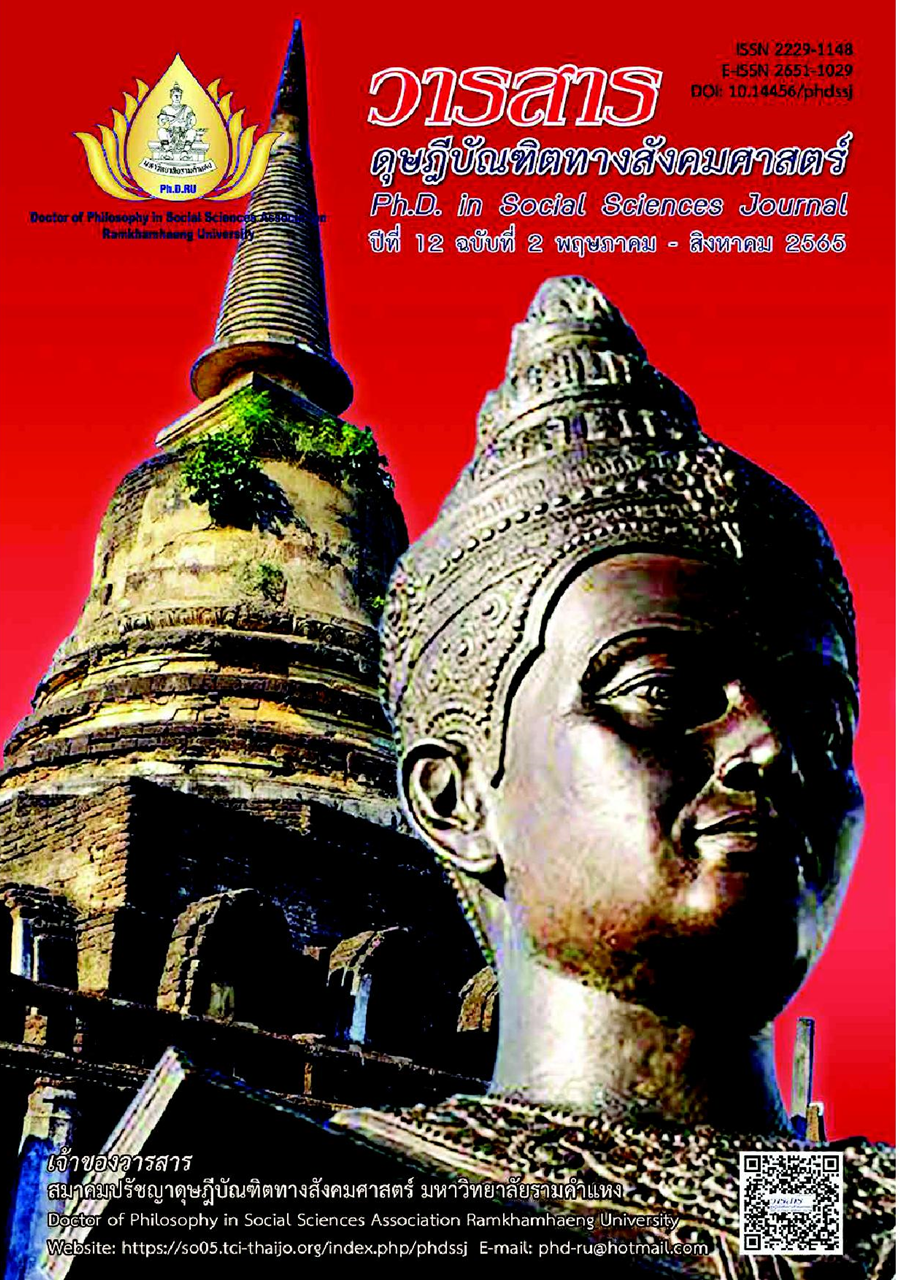A Personnel Development Model Based on the Sufficiency Economy Philosophy for Rajamangala University of Technology in Bangkok Metropolis
Main Article Content
Abstract
This research article aimed to study (1) the policies and guidelines for personnel development of Rajamangala University of Technology, (2) create a model for personnel development based on the sufficiency economy philosophy, and (3) assess the model of personnel development in accordance with the sufficiency economy philosophy. The research consisted of 3 steps. In step 1, interviews were conducted with six executives of University. In step 2, via the use of Delphi techniques, In step 3, five professional and academic experts were recruited in a focus group discussion.
The research results showed that: regarding the policies and guidelines for human resource development Secondly, personnel development model based on the sufficiency economy philosophy was created which consisted of 4 areas, namely, an investigation of the university’s strategies and plans, human resource selection; training and development of knowledge, skills and attributes; and human resource maintenance based on the principles of moderation, reasonableness and self-immunity through the inoculation of knowledge condition for human resource in major activities and, (3) the assessment of the model by experts confirmed the appropriateness of the model and suggested to include principles regarding moral condition as well as human resource advancement.
Article Details

This work is licensed under a Creative Commons Attribution-NonCommercial-NoDerivatives 4.0 International License.
Academic articles, research articles, and book reviews in the Ph.D. in Social Sciences Journal are author’s opinions, and not the publisher’s, and is not the responsibility of the Ph.D. in Social Sciences Journal Philosophy Association, Ramkhamhaeng University. (In the case that research is done on human, the researcher has to be trained in Ethics for Doing Research on Human Training and has to produce the evidence of the training).
References
Adiwattanasit, J., & Thorrathee, S. (2013). The development of human resources of Mahachulalongkornrajavidyalaya University. Retrieved from https://bri.mcu.ac.th/new/wp-content/uploads/2015/06/08.pdf [In Thai]
Armstrong, M. (2000). Strategic human resource management. Kogan Page.
Cappelli, P. (2002). Hiring and keeping the best people. Harvard Business Review Press.
Charoenboon, N. (2008). Human resource development guidelines, Phop Pha district, Tak province. Master Thesis of Arts, Kamphaengphet Rajabhat University. [In Thai]
Cheubangkaew, P. (2007). Human resource management. Bangkok University Press. [In Thai]
Delahaye, B. L. (2005). Human resource development: Adult learning and knowledge management (2nd ed.). John Wiley & Sons.
Holbeche, L. (2005). The high performance organization: Creating dynamic stability and sustainable success. Elsevier.
Ibarra, H. (2004). Coaching and monitoring. Harvard Business School Press.
Joungtrakul, J. (2010). Human resource development: Theory and practice. International Business Law Center. [In Thai]
Keeves, J. P. (1988). Educational research, methodology and measurement: An international handbook. Pergamon.
Khambunrat, W., & Pichitpornchai, S. (2013). Business strategy and human resource management system toward ASEAN Economic Community. Panyapiwat Journal, 4(Special Issue), 115-123. [In Thai]
Kusumavalee, S. (2016). Human resource and organization management and development of companies in the creative industry. Human Resource and Organization Development Journal, 8(1), 4-31. [In Thai]
Leggatt, S., & Dwyer, J. (2003). Factors supporting high performance in health care organisations: A review of the literature. National Institute of Clinical Studies, Australia.
Manmee, T. (2013). The employees commitment to local administrative organizations in northern provinces. Doctoral Thesis of Philosophy (Public Administration), Mahachulalongkornrajavidyalaya University. [In Thai]
Misomnai, C. (2015). Human resource development. Sukhothai Thammathirat Open University Press. [In Thai]
Mushemeza, E. D. (2016). Opportunities and challenges of academic staff in higher education in Africa. International Journal of Higher Education, 5(3), 236-246.
Noonin, S. (2013). Human resource management according to the philosophy of the sufficiency economy. Dusit Thani College Journal, 7(2), 160-174. [In Thai]
Office of the National Economic and Social Development Board. (2014). Sufficiency economy philosophy (4th ed.). 21 Century. [In Thai]
Office of the National Economic and Social Development Council. (2018). National strategy 2018-2037 (summary). Author. [In Thai]
Office of the Permanent Secretary for Interior. (2017). A guide to applying the philosophy of sufficiency economy to the way of life. Author. [In Thai]
Phrommani, P., Eiamsa-Ard, S., & Grasung, P. (2017). Guideline to construct and development model for public health operations for public health officer. Association of Private Higher Education Institutions of Thailand Journal, 6(2), 128-135. [In Thai]
Piboonsarawut, P. (2011). Philosophy of sufficiency economy and Thai society. National Institute of Development Administration. [In Thai]
Pitakvong, V. (2016). Educational leadership roles. Retrieved from https://www.gotoknow.org/posts/454500 [In Thai]
Rajamangala University of Technology. (2016). The history. Retrieved from https://th.wikipedia.org/wiki/มหาวิทยาลัยเทคโนโลยีราชมงคล [In Thai]
Sherman, A. W., & Bohlander, G. W. (1992). Managing human resources (9th ed.). South-Western College.
Swanson, R. A., & Holton, E. F. (2009). Foundations of human resource development (2nd ed.). Berrett-Koehler.
Thungpao, R. (2010). Human resources development and management report in the cavalry school of the Royal Thai Armed Forces in Saraburi. Royal Thai Army College, Institute of Advanced Military Education. [In Thai]
Wedchayanon, N. (2016). Human resource management. National Institute of Development Administration. [In Thai]
Werner, J. M., & DeSimone, R. L. (2006). Human resource development (4th ed.). South-Western College.
Wongsansri, P. (2009). Human resource management (5th ed.). Suan Dusit Rajabhat University. [In Thai]
Yuenyaw, P. (2009). The model of human resource management in higher education institutes. Doctoral Dissertation of Philosophy, Silpakorn University. [In Thai]


